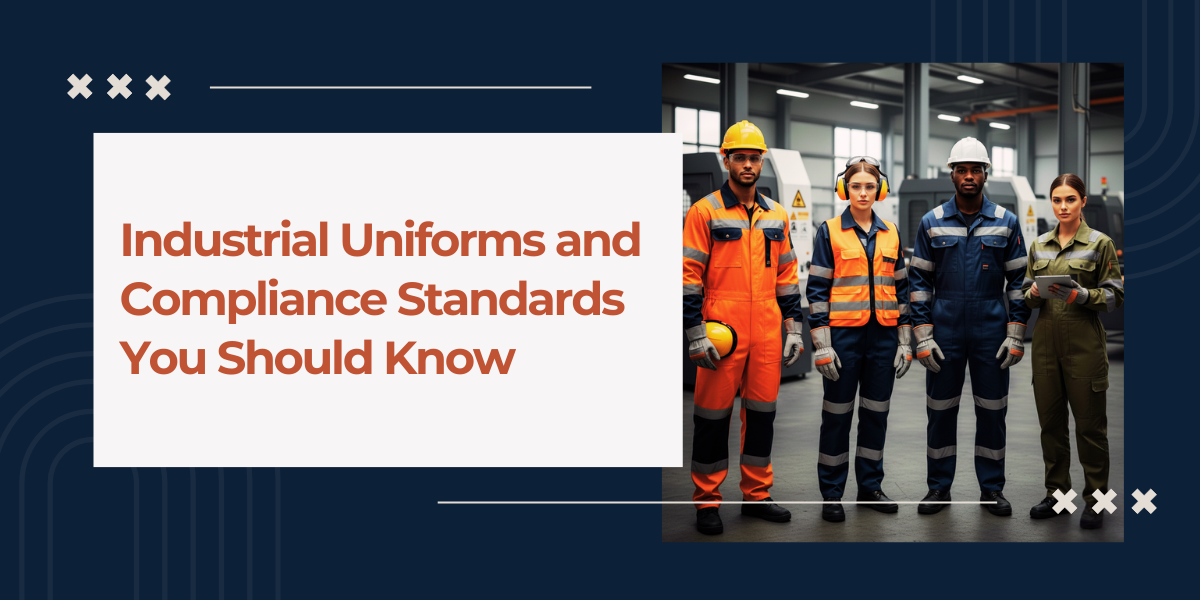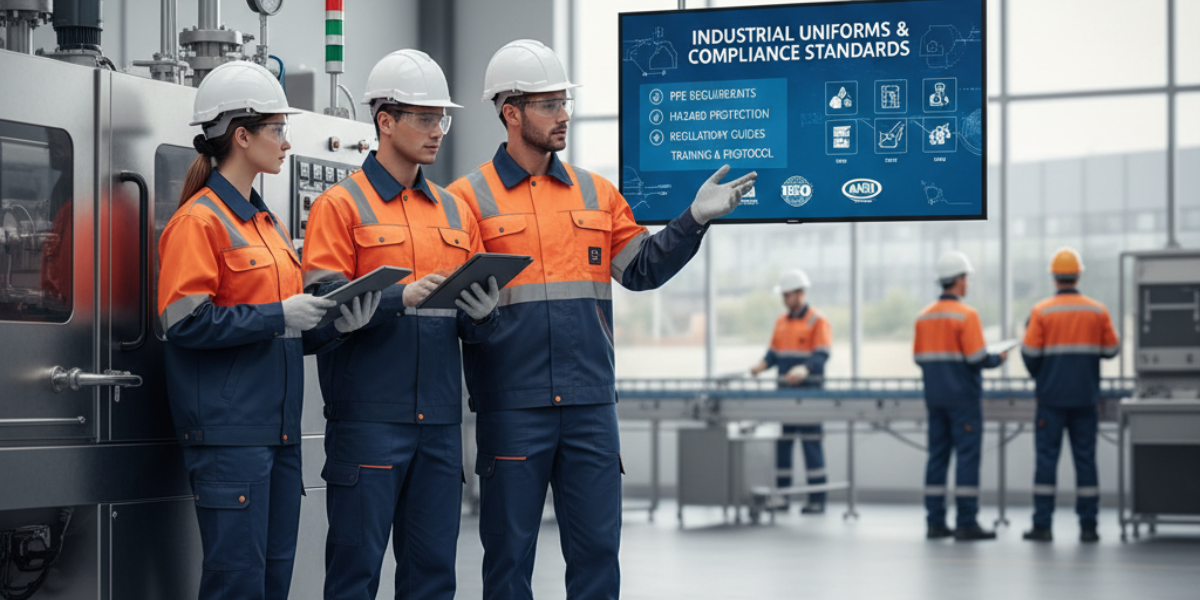Industrial Uniforms and Compliance Standards You Should Know

Industrial workplaces are not any normal corporate settings. They are often manufacturing plants or oil & gas fields, where you need the best safety measures to keep the team safe. So, adherence to regulations is a necessity.
But what do you need to know about industrial uniforms and compliance? Can you just pick any uniforms from the random vendor, or do you need to make sure you get the high-quality ones?
Now, the uniform is not just about branding; it’s also about protecting your workers. So, while you are at it, ensure the high quality and compliance. How? By understanding the basics and standards you need to keep.
Why Industrial Uniforms and Compliance Matter
There is more to uniforms than just a dress code. They serve as protective equipment in hazardous settings, shielding employees from burns, chemical spills, electrical hazards, and environmental exposure.
By ensuring that each uniform meets specific industry and regional standards, Industrial Uniforms’ compliance standards ensure worker safety while employers fulfil their legal obligations. Compliance connects fashion, safety, and standards through high-visibility materials and flame-resistant fabrics.
Compliance is mandatory for businesses operating in areas with stringent enforcement, like the GCC countries. Industrial uniform compliance standards by authorities ensure that employers provide the appropriate protective gear for the job. Although these standards vary from one industry to another, they all aim to reduce workplace risks.
The Role of Specialized Industrial Uniforms in Safety
Safety gear and industrial uniforms provide more than just a polished look. They offer the essential shield between employees and potential risks. Flame-resistant (FR) uniforms, for instance, protect workers from burns in high-risk situations.
Likewise, high-visibility uniforms reduce the chance of accidents by protecting employees in dimly lit or busy areas.
Specialized uniforms can increase production safety by offering protection and enabling worker mobility when they are made correctly by the top uniform manufacturer in the UAE. Employees can perform their duties effectively when they are aware of their gear, which lowers risks.
- Defense Against Risks
- Compliance with Workplace Safety
- Improved Contamination Control and Hygiene Benefits of Ergonomics and Injury Prevention
- Benefits to Productivity and Psychology

Key Compliance Standards to Know
Each nation and industry has its own workwear regulations. Among the most well-known workwear compliance requirements are:
- ISO Standards: Address the durability, fire resistance, and textile quality of industrial textiles.
- ANSI/ISEA: Construction and roadwork high-visibility uniforms are governed by the American National Standards Institute, or ANSI/ISEA.
- NFPA 2112 and 70E: Make sure that clothing used in the electrical, gas, and oil industries is flame-resistant.
- OSHA Guidelines: Require protective gear in the US to reduce the number of work-related accidents.
- Safety Uniforms UAE Regulations: Demand that companies operating in the country supply compliant uniforms, especially those in the construction, oil and gas, and healthcare industries.
To ensure uniforms comply with the latest compliance updates, employers should periodically review these standards and collaborate with reputable uniform manufacturers in the UAE or regional suppliers.
Custom vs. Standard Industrial Uniforms
Custom vs. Standard Industrial Uniforms is one of the topics of continuous debate in the industry. Customized solutions enable employers to customize fabrics, colors, and safety features to their unique work environment, while standard uniforms frequently satisfy minimum compliance requirements. For example:
- Standard uniforms are readily available and reasonably priced, but they might not be sufficient to cover all potential risks.
- Custom industrial uniforms provide excellent protection and comfort while being made with particular hazards in mind (e.g., chemical-resistant coatings, antistatic fabrics).
Customized uniforms can lower long-term risks, increase worker satisfaction, and avert expensive accidents, even though they may initially cost more. Meeting industrial uniforms and compliance standards through customization ensures safety, durability, and better alignment with workplace regulations.
Role of Safety Wear in High-Risk Environments
Industrial coverall uniforms have an important role in sectors like heavy manufacturing, mining, and oil and gas. These one-piece outfits offer complete body protection from chemicals, dust, and sparks. Flame-resistant coveralls that meet NFPA or similar standards are often required for workers handling electricity or working in areas with fire hazards.
Similar to this, high-visibility jackets, helmets, gloves, and footwear are all part of industrial uniforms & safety wear, and they must all adhere to compliance regulations. If uniforms don’t fit these standards, worker safety may be jeopardized, and companies may face legal repercussions.
Ensure Compliance Through Suppliers
Procurement is where compliance starts. Employers need to select trustworthy uniform suppliers in the UAE or other regions that are familiar with safety regulations and can ensure that uniforms meet the required standards. Among the best practices are:
- Requesting fabric and design certifications.
- Verifying the supplier’s proficiency in creating industrial workwear that complies with regulations.
- Ensuring that, before being used, uniforms are put through safety and durability testing.
- Looking at the performance histories of suppliers for major industrial contracts.
Working with seasoned suppliers guarantees compliance without sacrificing quality, whether you choose to buy customized uniforms in the UAE or source pre-made designs. The right partnership helps maintain industrial uniforms and compliance standards, ensuring safety, comfort, and reliability across every industry.
Conclusion
When searching for industrial uniforms near me, businesses must prioritize compliance and safety alongside comfort and durability. Understanding industrial uniforms and compliance standards ensures protection against workplace risks while meeting legal obligations. In regions like the UAE, choosing the right supplier makes all the difference.
Silver Thread UAE, a trusted uniform manufacturer, delivers high-quality, regulation-compliant industrial uniforms tailored for various industries.
From flame-resistant fabrics to high-visibility workwear, they combine safety, branding, and functionality to create a comprehensive solution that meets the needs of both safety and branding requirements.
Partnering with experts like Silver Thread UAE not only safeguards your workforce but also builds confidence in your operations.
FAQs
-
What are the key industrial uniform compliance standards businesses must follow?
Businesses must follow ISO standards for textile durability, ANSI/ISEA guidelines for high visibility, NFPA regulations for flame resistance, OSHA guidelines in the U.S., and safety uniform requirements, as well as UAE regulations, to ensure workplace compliance and worker protection.
-
Why are safety uniforms important for meeting compliance standards in the workplace?
Safety uniforms act as protective gear, reducing risks of burns, spills, and accidents. They ensure compliance with regulations, helping businesses safeguard workers while avoiding penalties and promoting a safer, more productive work environment.
-
How do workwear compliance requirements vary across different industries?
Workwear compliance varies by risks: construction and roadwork require high-visibility gear, oil and gas demand flame-resistant fabrics, healthcare focuses on hygiene, while manufacturing may emphasize ergonomics, durability, and protective features for specific operational hazards.

